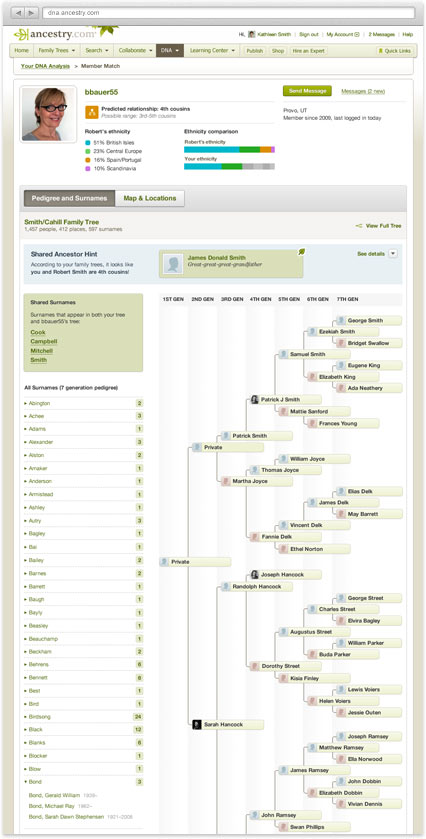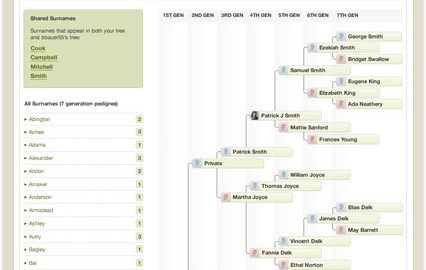Today Ancestry.com officially launched their autosomal DNA test, which they call simply: AncestryDNA
 |
| AncestryDNA user interface |
Frankly, I think the name is a bit confusing considering they have other tests for Y-DNA and mtDNA, but that’s a minor point. This new test now competes with FamilyTreeDNA’s Family Finder test and 23andMe’s Relative Finder test. So how does it compare?
The answer, unfortunately, is that I don’t know yet. The only people who have received results so far, considering it just launched today, are those who participated in the beta test, where Ancestry.com sent out tests to various groups of people that were already customers of Ancestry.com. In fact I was one of the people who received a free (not including shipping) kit, but unfortunately there were problems in getting the kit for a long time due to mail problems, so while I have submitted a kit, I haven’t received my results yet.
What I can tell you is what looks good even before I have a chance to look at the DNA results.
For one, I was very grateful they handle something that the other companies haven’t done yet – you can manage the DNA of other people. With 23andMe and FamilyTreeDNA, you essentially set up an account for each person whose DNA is submitted. This doesn’t always make sense. If you’re submitting the DNA of your grandfather who doesn’t use a computer, then you don’t want to have to deal with a separate account, remembering the password, etc. Ancestry.com handles this much better by allowing you to attach DNA kits from multiple people to your existing account.
Another place where Ancestry.com seems to have put in some thought, is connecting tests to people in your family trees. Of course, Ancestry.com has a major advantage here, as they have very sophisticated family trees, that already integrate with other features of their web site such as finding records. The other companies that pioneered autosomal DNA tests do not have family trees of anywhere near the sophistication of what Ancestry.com offers, and thus Ancestry.com holds a clear advantage in this area. You can attach a test, whether the AncestryDNA autosomal test, or one of the existing Y-DNA and mtDNA tests, to a person in your family tree, and presumably Ancestry.com uses that information to try to figure out connections between people who match DNA. How well that works remains to be seen, but it looks promising.
It’s not clear yet whether or not you’ll be able to upload data from another company, or whether you’ll be able to download your data either. Ancestry.com does allow you to download your Y-DNA and mtDNA results, so it makes sense they would allow this for their autosomal test as well, but this test is still in beta and there is no way to download the data as far as I know.
The test is supposed to be priced at $99 with a membership to Ancestry.com. What does that mean? I’m not sure. Is that a price you get once? or if you want to order more tests do you get that price on all tests? What if you’re not an Ancestry.com member? If you only get one kit at $99, does that renew every year when you renew your membership? I’m sure the pricing will be explained better soon.
Anyone else reading this take part in the beta? Did you receive your results? What did you think?

I took part in the beta, as did a number of other Geneabloggers. I blogged about my results at From Maine to Kentucky.
You bring up some good points. I’d love to get my husband tested, as his DNA should come back as 100% Jewish. I’ll have to explore being able to do this through AncestryDNA and link his results to him in my ancestry.com tree.
Elizabeth,
One other point. It will be interesting to see how quickly Ancestry.com’s autosomal database scales. 23andMe and FTDNA have a big lead in building their databases, which probably explains why they did the beta the way they did – to insure they launches with thousands of people in the database. Of course, not only do there need to be lots of people in the database, but there need to be lots of people from a similar background as you, the same ethnicicty, or you’re unlikely to find a match. Both 23andMe and FTDNA have large Jewish populations in their databases, particularly FTDNA. I wonder if the database of Ancestry with have a large number of Jewish people, or if it will skew toward less Jewish people than the others based on the usage base of Ancestry. I don’t know the answer to that, but it will be interesting to see, especially for those people who will have their DNA tested in all three databases. FTDNA lets you import 23andMe results (as long as its the later V3 chip that was used) for a nominal fee. It will be interesting to see if Ancestry.com does the same. The ability to move data around between services will help eliminate the issue of finding which one has the most people from your background in their database.
It’s not clear what chip Ancestry.com uses in their test. If it’s the same chip (or at least from the same company) as FTDNA and 23andMe use, then their data will be interoperable. 23andMe uses the same chip as FTDNA, but with extra markers for their health analysis. Some people have suggested that FTDNA may even remove some markers from their to insure no health data is collected. If Ancestry is not the same, then it gets much more complicated to interoperate of course, but it’s not impossible.
I’ll have more to write once I get my results, which hopefully will be soon.
I’ve done both FTDNA and 23andme’s autosomal tests, and I’d like to make one comment or correction to what you’ve written. You are certainly correct that FTDNA makes you open a separate account for each test. However, 23andme not only allows for but makes it easy to have all your family members’ tests on a single account. You just have them enter the same existing account information when registering their test kits. I have a half dozen relatives on one account, and it makes it very easy to compare their matches and results without having to sign in to separate accounts.
Also, while I can’t say for certain, it seems pretty likely that Ancestry will in fact be using basically the same Illumina chip that the other two companies are using, so the results should be cross-compatible. The evidence for this is that Illumina recently reported a large sale to ancestry.